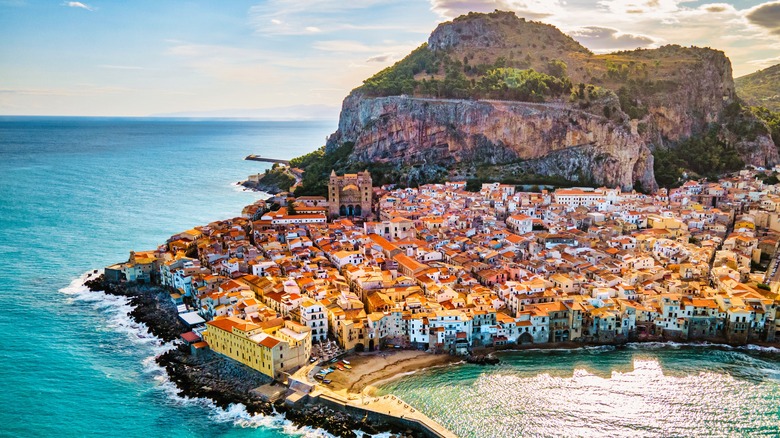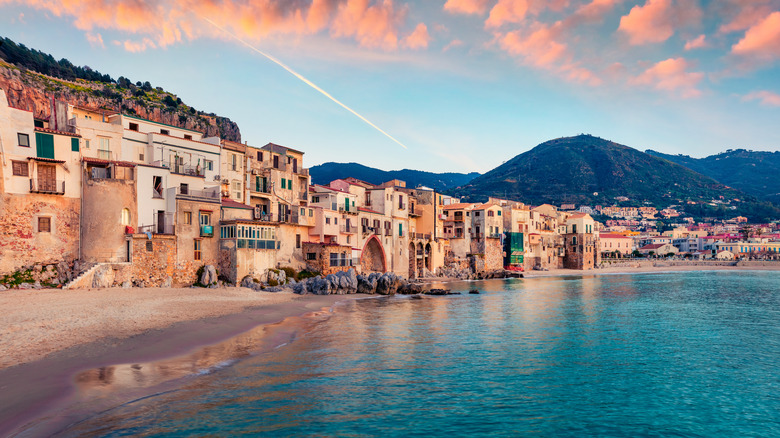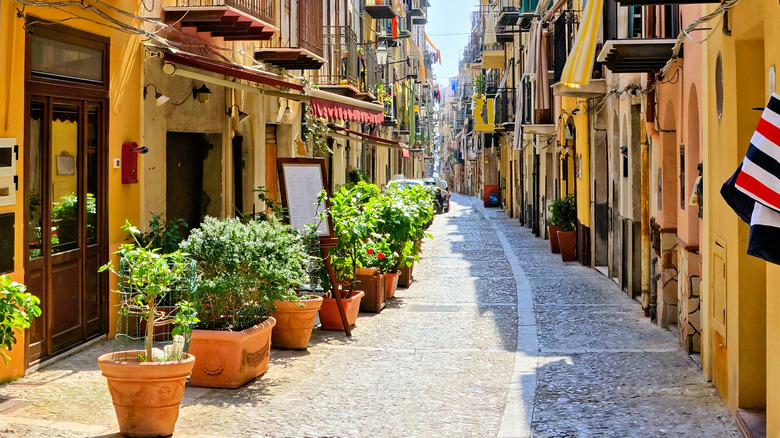Rick Steves' Favorite Town On The Island Of Sicily Is A Coastal Paradise Bursting With Color
Perched on the northern tip of Italy's Sicilian coastline is an underrated jewel wedged between the landscape's dramatic cliffs and the Tyrrhenian Sea. Just over an hour from Palermo, the capital of Sicily, Cefalù embodies the epitome of a stunning Italian beach town. With a vibrant nightlife scene, ancient architectural remnants, soft golden beaches, and an abundance of mouth-watering cuisine, it's easy to see what gives this small port town its easygoing charm. This picture-perfect seaside city was also used as the filming location for the iconic Italian film, "Cinema Paradiso."
If anyone knows the best underrated spots to plan an Italian vacation, it would be travel expert Rick Steves. Cefalù is at the top of his list, a small town hidden from the bustling urban center of Palermo. Cefalù's sloping side streets are brimming with a myriad of fresco-filled museums and elegant churches. According to Steves, however, the best part of this historic town in southern Italy is found in its lively city streets. You'll find an abundance of trendy boutiques and neighborhood eateries along Via Vittorio Emanuele, several of which boast captivating coastal views.
Spring tends to be the best time to visit this charming seaside escape, with the shoulder season promising smaller crowds among the sun-soaked beaches and a warm, moderate climate with plenty of sunshine. You also can't beat the reduced prices in the spring season, and you'll most likely find yourself saving some extra dollars on food and lodging.
Spending an idyllic day in Cefalù
History and culture make up much of this dreamy seaside village in Italy through delightful ambiance and timeless traditions. The Cefalù Cathedral commands the attention of every visitor, and it's located in the heart of the town's main square. Its walls are embellished with decorative frescoes, hand-painted biblical scenes, and magnificent mosaics, including the famous Cristo Pantocratore (translated as "Christ Almighty").
Tucked on the edge of the town's port dock, and lined with a collection of beach bars and cafés, Spiaggia del Porto Vecchio is easily the most crowded beach in town during the warm summer months, but for all the best reasons. Guests of this beach can rent sunbeds or throw down a towel underneath a fringed umbrella for a bit of relaxing in the shade. Boasting an exquisite stretch of golden sand, it's the perfect spot for an early morning stroll before the crowds arrive, sunglasses and beach towels in hand.
Molo di Cefalù, the old fishing pier, is another piece of sacred heritage that carries the age-old history of this town. The fishing dock speaks to Cefalù's ancient past as a fishing town, and it also offers some of the most picturesque views of the city's orange-tiled abodes. Enclosed by a small sandy cove, this historical corner of Cefalù still houses old fishermen quarters situated on the sand banks of this port. Located adjacent to Molo di Cefalu is Porta Pescara, one of the city's ancient medieval gates when it was surrounded by defensive walls.
Explore Cefalù's culture and cuisine
It's no secret that Italy is responsible for gifting the rest of the world with some of its most beloved dishes, and Sicily is no exception. We can thank this southern region for the ricotta-filled cannolis — a native culinary stamp across the island. The streets of Cefalù are filled with local cannoli carts, delivering a montage of flavorful fillings stuffed into deep-fried pastry dough. You can try some of Cefalù's sweet treat staples at Osteria del Duomo, a quaint, quiet venue sheltered underneath the terrace of the Duomo. This all-day dining spot offers traditional homemade pasta and Sicilian desserts.
Street markets are a local trademark around Cefalù. Every Saturday, the town gathers to display a festive arrangement of local fruits, veggies, and vending carts. Panelle (fried chickpea fritters) and arancini (deep-fried rice balls) are two traditional street food items that are common sightings at Sicilian open-air markets.
Cefalù's ancient history is evident in nearly every corner of this town, with a particularly unique gem not to miss. The Lavatoio Medievale is a preserved laundry site resting on the edge of a creek. Supplied with fresh water from a nearby spring, it provides a glimpse into the daily lives of ancient people who once occupied this Sicilian territory. The plethora of culture retained in this city makes it easy for visitors to live by the essential tip Steves gifted his audience— "Don't just visit Sicily — live it."


